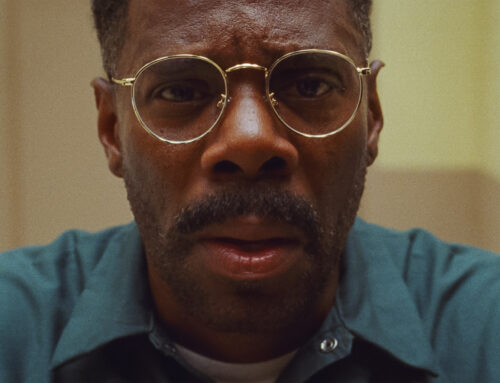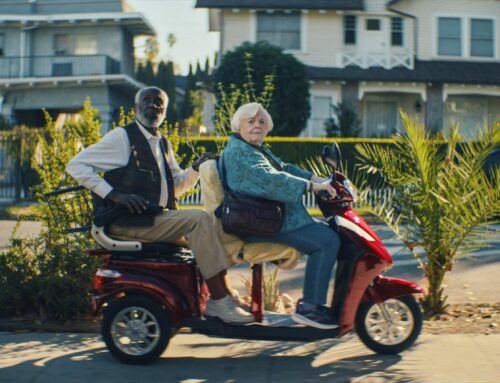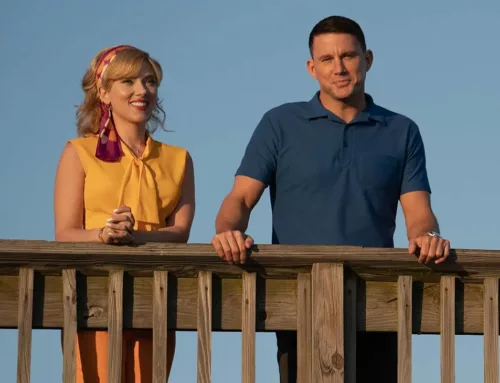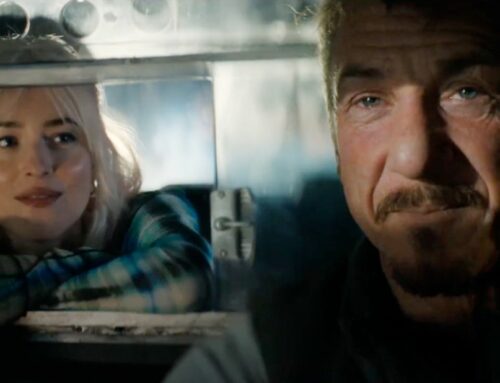What a wild and strange year for films. It took forever to find its groove, most of the best films landing in a heap on our doorsteps this fall on their way to being swept into awards season. And there was no one film that critics seemed to coalesce around though several have made it onto many top ten lists including mine. And there were many disappointments– Damien Chazelle’s overblown, derivative, sentimental “Babylon” with its star-studded cast soaked in the debauchery of the imagined early days of Hollywood; the provocative but incoherent amalgamation of set pieces that amounted to Jordan Peele’s eagerly awaited “Nope” about the early days of film & TV laced with racism, anger in the form of a rampaging chimp, and hungry UFO’s; the superficial, undercooked “Don’t Worry Darling” touting Harry Styles in a cosmetically enhanced retread of a “Stepford Wife”-like saga, “Armageddon Time” featuring a top tier cast and worthy subject matter but which shed no new light nor moved me a wit; “The Batman” as thrilling as a wet sock with a gloomier than usual Robert Pattinson sulking in the rubber suit.
But once the fall hit, screens large and small were flooded with movies large and small from of a stunning array of voices, famous and not, channeling the broody zeitgeist around the world, and expanding the conversations movies start with us. Here are the films I enjoyed most this year, unranked. Some are among the best films of the year, but all of them moved me in unexpected ways.
— THE FABELMANS is a fictionalized biopic by Steven Spielberg about his family and his budding relationship with movies. The film– at 151 minutes of revelatory sequences most of which work– begins with young Sam Fabelman’s first time seeing a movie in a theater where he is simultaneously terrified and thrilled. The film highlights his eccentric, brilliant parents–musician mother (Michelle Williams) and nerd scientist dad (Paul Dano)–both of whose talents rubbed off on Fabelman. In a pivotal sequence, Sam has an epiphany and sees something he had captured on film that he didn’t realize he was recording; the moment unlocks for him and for us the camera as a means of not simply recording, but also revealing. We will see him apply that capability in various circumstances– fending off bullies, mythologizing the class hunk–and also witness the young filmmaker’s growing understanding of the camera’s power to shape reality and an audience’s view of their world and themselves. It’s a remarkably astute assessment of the nature of art, the primacy of the artist’s voice, and how it shapes an artist’s life in the world. Despite a few overlong sequences, I was enthralled by what it said, how it said it, and how an artistic genius can be nurtured in the world.
— WOMEN TALKING is Sarah Polley’s potent take on Miriam Toew’s book based on the TRUE story of the women in a Bolivian Mennonite community who were being routinely sexually assaulted by the men. Here, the story has been transposed to an isolated American religious sect with most of the action set in a hayloft where the women debate what to do: Stay? Fight? Leave? The cast is a who’s who of brilliant actresses including Rooney Mara, Claire Foy, Jessie Buckley, and Frances McDormand. Ironically it’s a lone man (Ben Whishaw) who’s the one taking dictation as the women’s voices range freely over the pros and cons of how to proceed under the yoke of abusive male power and thought. None of these women can read or write and some critics have complained their conversation is too sophisticated for such an uneducated bunch. I say their lack of education would not diminish their capacity to lean on their oral tradition, and, fueled by anger and injury, to coherently dissect their options.Their conversation is wide ranging, far beyond the boundaries of the space in which the action takes place. The film becomes a template for how to navigate any oppressive power structure and the gaslighting that goes with it.
— GOOD LUCK TO YOU, LEO GRANDE Emma Thompson and Daryl McCormack (“Bad Sisters”) are extraordinary together in this tale of a widow, Nancy Stokes, who seeks out a sex worker, Leo Grande, to expand her sexual horizons beyond the conventions her traditional marriage afforded. I couldn’t wait to see how each scene would begin and end; I had no idea where this situation was headed, or that it would be a wise and liberating exploration of two human beings connecting beyond the bounds of their agreed upon arrangement. Gradually, in an extraordinarily well-calibrated series of increasingly intimate physical, emotional, funny, awkward, painful scenes which transcend standard rom com tropes, we arrive at a stunning final moment which demonstrates the power of embracing one’s whole self in the world.
— AFTER YANG by Korean filmmaker Kogonada is a lyrical meditation on what makes us human in an increasingly virtual world. Set in a non-specific future place and time, Colin Farrell plays a tea salon owner Jake who along with his wife Kyra (Jodie Turner-Smith) have purchased a used android– a “techno sapien”– named Yang (Justin H. Min) as a companion for his adopted daughter, Mika (Malea Emma Tjandrawidjaja). After Yang suddenly breaks down, we are invited to explore who Yang was, what he meant to the family, to his daughter, and by extension what that says about who any of us are and what constitutes identity. The images are muted and dreamlike as our ideas about Yang slowly deliver us to the threshold of life and death and the nature of creation itself. Farrell brings a muffled urgency to his exploration of what it means to be alive, to be a family, and our connections to each other. Haunting.
— THE BANSHEES OF INISHERIN also stars Colin Farrell with Brendan Gleeson as Colm in this fable about two old friends, Padraic and Colm, on a fictional island off the coast of Ireland– Inisherin. (Sounds a lot like Inisheer, an Aran island which I visited with my mom!) One day, Colm announces he doesn’t want to be friends anymore preferring to focus instead on composing and creating music– something lasting– rather than on the empty palaver of his less ruminative friend Padraic. The baldness of the declaration brings us to the brink of the absurdity of the human condition. Colm’s simple pronouncement sets off a series of darkly humorous, grizzly, poignant, and tragic events. Farrell and Gleeson are a gripping duo, Director Martin McDonagh’s script is a minimalist thing of beauty with maximalist implications; set against the wild backdrop of a desolate landscape which may not have much pity on its inhabitants, we take a deep dive into the evolving nature of friendship and community, what makes life worth living, and how we face mortality as we draw ever closer to the end. Stunning performances in its supporting cast from Kerry Condon and Barry Keoghan.
—ELVIS Baz Luhrman’s trademark kaleidoscopic take on Elvis’s rise to stardom through the lens of Elvis’s carnival barker manager Colonel Tom Parker, played by Tom Hanks under a heap of prosthetics. Austin Butler in the eponymous role is remarkable–he sings the songs, has the moves and looks, but more importantly captures Elvis’s vulnerability, charisma, and sexual magnetism from the curled lip to the sly awareness of what he was doing, even as he was unaware of what the colonel was doing. The filmmaking puts us inside the show and outside the the spectacle with special attention paid to Elvis’s mom and dad, all vividly filtered through Luhrman’s talent for illuminating the dark beneath the dazzle of showbiz.
—HOLY SPIDER Shot in Jordan but set in Iran, Iranian filmmaker Ali Abbasi tells the tale of a female detective (Mehdi Bajestani) who sets out to find a serial killer who’s murdering prostitutes in the holy city of Mashad in the name of religion. Based on a true story, the film is an indictment of the suppression of women globally and more specifically as a result of local cultural, religious, and political mores which may be complicating the police’s efforts to find the killer who some would say is doing their job for them: ridding the streets of the filthy women who sell their bodies to survive. Bajestani is compelling as a woman up against the patriarchy on almost every front, sparring with clerics, fending off advances by arrogant male superiors, modulating her appearance and affect in order to appease the powers that be. The climax of the film pits the detective against this web of competing forces with a terrifying coda that underlines the pervasiveness and intransigence of misogyny in the world today.
—ALICE, DARLING Filmmaker Mary Nighy’s psychological thriller caught me off guard. It’s a piercing look at something not frequently made this explicit and which is difficult to dramatize — the mental and emotional abuse of a young woman (Anna Kendrick) by her boyfriend Simon (Charlie Carrick) and the ways in which it stunts her identity as she grows increasingly fearful and unsure of herself. When she goes off on a weekend getaway –without telling Simon and with her 2 closest girlfriends (Kaniehtiio Horn and Wunmi Osaku)– we see her through their eyes, and she is changed from the girl they used to know. The film’s cinematic ancestor 1944’s “Gaslight” starring Ingrid Bergman was cloaked inside a mystery thriller involving a thieving husband and a heroine saved by a good man with potential romantic interest. Here, the refreshing climax hinges on the strength and friendship of women. Gripping and restorative, the last scene shook me to the core. And what do you know, “gaslighting” happens to be Merriam-Webster’s the word of the year.
—TAR Writer/director Todd Field’s first film in 16 years, stars Cate Blanchett in a compelling and enigmatic performance as Lydia Tar world famous composer/conductor preparing to record “Mahler 5” as the first female conductor of the Berlin Orchestra. An openly queer woman in a male-dominated historical hierarchy, she wears severely elegant pantsuits, cohabits in a stark, sprawling, glassed-in bunker of a penthouse at the intersection of power, fame, and the corruption it is heir to. She deftly maneuvers the players on her board, steers the backstage politicking to her advantage, juggles jealous colleagues (Mark Strong) lapping competitively at her heels, and commands her increasingly resentful personal assistant (Noemie Merlant). Then it all starts to go south. Blanchett’s face, like a mask beginning to crack, mesmerizes. Her trademark impenetrability is echoed by the austerely beautiful images the film orchestrates, and the result is an invitation to an aloof persona we cannot refuse.
—TOP GUN: MAVERICK is a top notch entertainment which satisfies all of the requirements of the genre: it’s exciting, clearly told with a classic story arc–though not without surprises, and anchored in characters we recognize as distinctly American– individuals loaded with can do optimism–here embodied by an indisputably charismatic, global, veteran and apparently ageless movie star. Tom Cruise has returned 37 years after the original in one of the best ever movie sequels ever as hotshot fighter pilot Pete Mitchell, call sign “Maverick” –which he still is. I don’t give a hoot about fighter jets– and I was on the edge of my seat!
**********
MORE excellent movies to see now: “Till” “Decision to Leave” “The Woman King” “Everything Everywhere All at Once” “Blonde“






Leave A Comment
You must be logged in to post a comment.